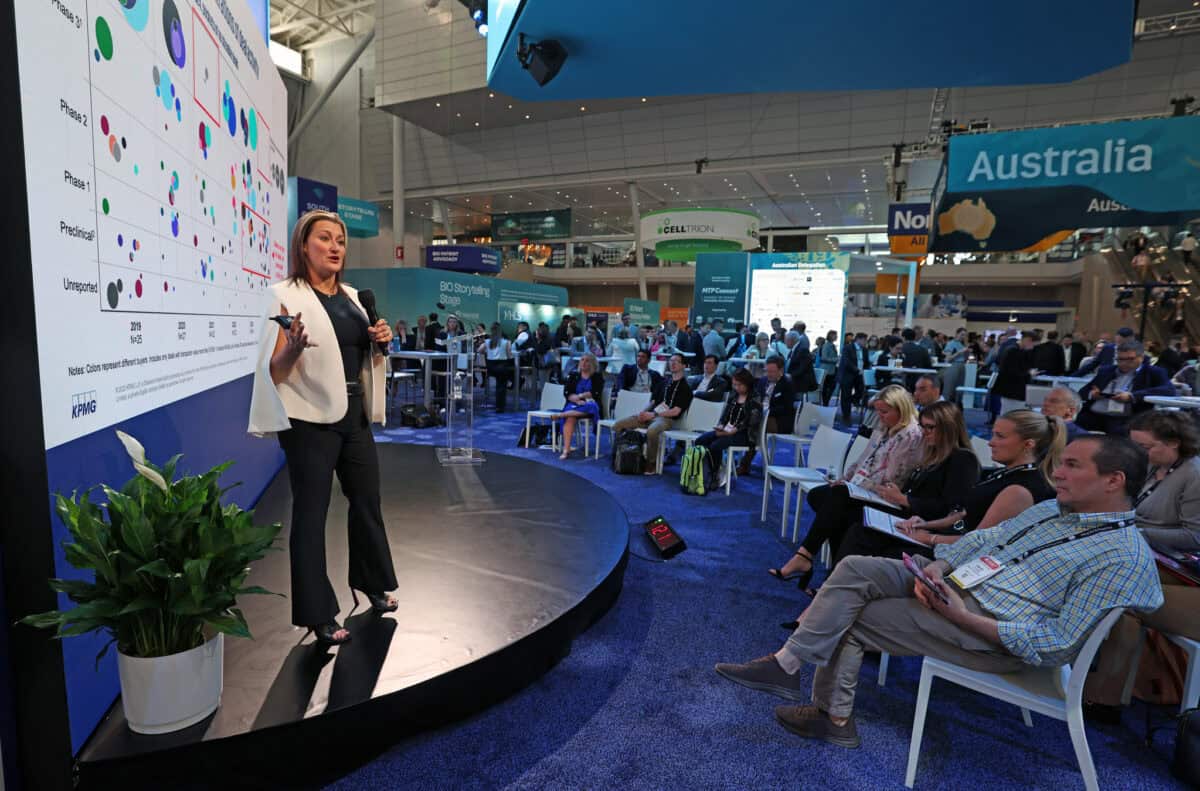
At the 2025 BIO International Convention in Boston, Kristin C. Pothier of KPMG delivered a candid and insightful presentation on the future of scaling innovation—offering a blend of realism and optimism that resonated with the audience gathered at the Massachusetts Pavilion.
As Pothier put it plainly, “The grim reality of trying to take innovation and bring it to scale is that we have a little less dollars, right? We have to do more with less” The life sciences sector is facing headwinds: economic pressure, policy uncertainty, and challenges in both research and clinical infrastructure.
The balancing act between constant innovation and cost efficiency is magnified in tumultuous times like the industry finds itself today.
Innovation in a time of constraint
Pothier emphasized that the path forward for biotech and life sciences companies requires strategic foresight. “We have to be more prepared, we have to do more scenario analysis,” she said. “Especially if we’re corporates—but really, all of us in this ecosystem need to be ready for what’s coming next.”
Despite these constraints, she reminded the audience that the sector continues to feed into a “multi-trillion dollar industry” that is still expanding. Medtech is waking up again, diagnostics are pushing into the forefront, and biopharma continues to evolve. “One of the biggest changes we’ve seen is distributors coming into the fold—buying physician practices and exploring new ways to bring services to patients globally,” she added.

M&A activity remains slow, with large-scale deals rare. “2024 was not a great year for deals,” Pothier acknowledged. “At the end of the year, we surveyed the market and 60% of people expected a higher deal count and more revenue in 2025. Neither of those have happened in 2025.”
However, she noted that smaller deals and strategic collaborations are thriving. “The strongest innovation right now is coming from licensing and smaller partnerships—not necessarily the blockbuster acquisitions.”
This shift also means more scrutiny and diligence are being applied to every transaction. “Every single deal we do is more important, more interesting,” Pothier said. “We’re doing more diligence to make sure the integration or the separation actually works.”
Oncology and cell therapy are bright spots
Pothier identified oncology as the hottest therapeutic area in precision medicine today. “We’ve been excited about oncology for 20 years—and that’s only accelerated,” she said, citing advances in biologics, cell therapies, T-cell engagers, and antibody-drug conjugates. “And it’s not just the therapies—the platforms, reagents, and tools around them are also thriving.”
In cell and gene therapy, momentum continues. “Yes, we’re seeing some natural slowdowns,” she explained, “but that’s expected as the pipelines mature. The excitement is still there.”
She noted that CAR-T therapies in particular remain robust, but she also flagged concerns around technical capabilities and capacity constraints. “Are we ready yet to handle the full onslaught of advanced therapies in the same way we handle traditional drugs?”

AI as a strategic lever
Artificial Intelligence, once viewed with skepticism in biotech, is now becoming mainstream—at least in operational areas. “We’ve always said AI is for consumer retail,” Pothier said, “but now we’re realizing it can help us, too—in the front, middle, and back office.”
While biotech companies are still cautious about using AI for frontline decisions or molecular discovery, it’s already proving valuable in regulatory documentation, inventory management, and SOP optimization. “Millions of dollars are being saved,” she emphasized, adding that “AI is a consideration in every tech alliance we do at KPMG.”
The regulatory landscape is catching up, too. “The FDA is listening,” she noted, “and they’re developing AI-related guidance. That’s huge for all of us.”
Looking ahead with Massachusetts at the helm
Pothier closed with a hopeful but clear-eyed assessment of the future. “Yes, we’re seeing geopolitical tensions, economic issues, and innovation that’s hard to contain—but if we’re smart, and we do our diligence, we can still have a great second half of the year, and a great set of years to come.”
And nowhere is that smart, strategic thinking more concentrated than in Massachusetts. As a Boston native, Pothier acknowledged the region’s outsized role in shaping the global biotech landscape. “We’ve always been known as kind of the ivory tower of the cities—with all of our universities, all of our venture groups,” she said. “We spend a lot of time with our heads in the clouds thinking up ways to innovate, and now have to balance that innovation with operationalism.”
The challenge, she added, is to translate that innovation beyond Boston. “How do we then get it to everybody else?” Precision medicine, she emphasized, must not only be developed in elite research hubs—it must reach patients globally.
But the opportunity is clear: Massachusetts has the intellectual capital, startup energy, and collaborative infrastructure to continue leading the way—not only in scientific discovery but in the operational transformation needed to bring precision medicine to scale.
AI was used during the process of writing this blog post.